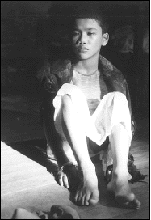|
|
|
監督・脚本:ニック・ディオカンポ
Director, Script : Nick Deocampo |
1959年マニラ生まれ。パリやニューヨークで映画を学び、フィリピン・インディペント映画界を代表する理論家、作家として台頭する。特に1983年から1987年にかけての8mmドキュメンタリー3部作『オリバー』('83)、『体制の子供たち』('85)『革命は歌の繰り返しのように』('87)でフィリピンの貧困と売春を生々しく捉えて注目を浴びた。他に『Isaak』('94)、『性戦士とサムライ』('95)など。またモウェルファンド映画学校の校長として、大胆な実験的作品を発表する若手を支援してきた功績も大きい。本映画祭’89アジア・シンポジウム参加、同映画祭’91には同監督の『イナンバヤン』を招待上映。 Born in 1959 in Manila. Studied Film in Paris and New York. Important critic in Philippine independent cinema, as well as a leading filmmaker. Noted in particular for a 3-part documentary series of 8mm works produced between 1983 and 1987-- Oliver ( ' 83), Children of the Regime ( ' 85), and Revolution Happens Like Refrains in a Song ( ' 87)-- that deal graphically with poverty and prostitution in the Philippines. Other important works include Isaak ( ' 94), The Sex Warriors and the Samurai ( ' 95). Is also head of the Mowelfund Film Institute, which has played an important role in allowing young filmmakers to produce bold, experimental works. He took part in the YIDFF ' 89 Asia Symposium and his Ynang Bayan was a special invitation film at YIDFF ' 91. |
 |
|
| 監督の少年時代、父親が家族を捨てて家を出た。どうしてなのか。どこへ行ったのか。この作品は、出奔した父親を探し求める監督の旅を描いている。だが、監督の父親への思いは苦く複雑であり、監督の父親探しの旅は、家族の物語=歴史であると同時に、映画やゲイへの嗜好など監督自身の個人的アイデンティティを探し求める“父親殺し”の旅でもある。しかも、第二次大戦下における日本軍による祖父の虐殺、抗日運動にかかわった父親、また現在の父親が新人民軍のゲリラ活動に参加しているらしいという噂など、この旅はさらにフィリピンの物語=歴史へと膨らんでいく。監督自身の国内の旅の映像に、日本軍による祖父の虐殺、アルコール中毒の父親とその家出などの再現シーンや、第二次大戦下における日米の戦闘、マルコス独裁政権下の反対運動とピープル・パワーなどのニューズ・リールが織り混ぜられ、プライベート・フィルム出身の監督ならではのユニークな作品となっている。なおこれはディレクターズ・カット版である。 (村山匡一郎) |
When the filmmaker was a youngster, his father moved out of the
house and abandoned his family. But why? And where did he go?
In this piece, the director describes his search for his absent
father. His feelings towards his father are bitter and complex.
His journey is both a narrative of his family's history and a
search for his personal identity in relation to his interest in
film and his homosexuality; it is also a journey about patricide.
Moreover, from his grandfather's slaughter at the hands of Japanese
forces during World War II, to his father's connection with the
anti-Japanese forces and rumors of his current participation in
guerrilla activities of the New Peoples Army, this voyage multiplies
to become an account of the history of the Philippines. Images
of a personal journey through his own country woven together with
scenes of his grandfather's murder; a re-enactment of his alcoholic
father's flight from home; and news reel footage of World War
II battles between Americans and Japanese, people power, and the
movement to oppose Marcos' political dictatorship. Deocampo, whose
roots are in " private film, " has come up with a truly unique
piece of work. This version is the director's cut. - Murayama Kyoichiro |
|
|
|
|
監督のことば 第二次世界大戦から50年経った今日、私は自分の家族が、いまだ日本の占領の引き起こした悲劇と格闘していることに気付く。戦争は4年で終わったが、その痛みは私の家族だけでなく、正義を求める叫び声を上げ続ける“従軍慰安婦”の一人一人、それに戦争で人生が元に戻しようもなく変わってしまったすべての人々を苛み続けているのだ。自分自身の個人的な歴史のなかに飛び込むことで、私は自分個人の苦しみが社会そのもののそれと並行していることを実感する。痛みはしばしば独りで苦しむものだ。 だからこの映画を作ることは癒しの行為に似ていた。自分の過去にとりついた苦悶の源を私は振り返る。見るという行為から理解が生まれる―そして理解から、許しが。日本人たち、父、家族、私自身―我々の全員が歴史の子供たちなのだ。過去のことを知れば知るほど、我々は人生を構成する喜びや悲劇との和解を見い出すことができるのだ。 |
Director's Statement Fifty years after World War II, I still find my family coping with the tragedy caused by the Japanese occupation. The war ended after four years but its devastation still causes pain, not only to my family but to every " comfort woman " still crying out for justice, and to all those whose lives have never been the same since the war. Plunging into my personal history, I realize that my sufferings parallel those in the rest of society. Pain is seldom suffered alone. Making the film therefore was like an act of healing. I look back at the source of the agony haunting my past. With the act of looking comes understanding, and with understanding --forgiveness. The Japanese, my father, my family, myself--we are all children of History. The more we know about our past, the better reconciled we can be with the joys and tragedies that make up our lives. |
